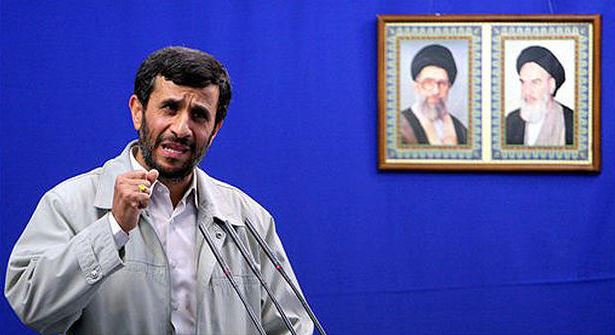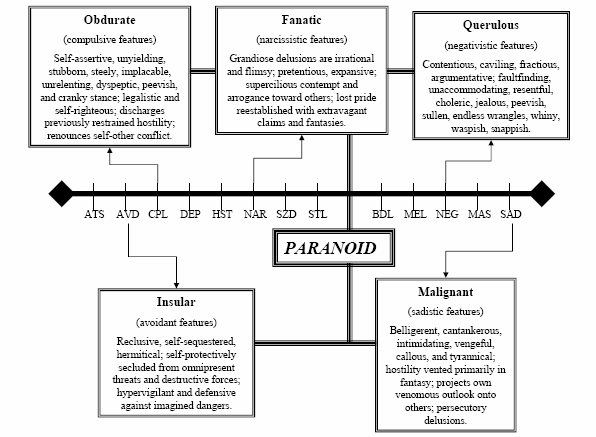The Personality Profile of Iran’s President Mahmoud Ahmadinejad
The Personality Profile of Iran’s President
Mahmoud Ahmadinejad
(محمود احمدینژاد)

President Mahmoud Ahmadinejad delivers a speech after attending an anti-Israel rally marking “Al-Quds Day” (Jerusalem Day), to support the Palestinian cause, in Tehran, Iran, Friday, Oct. 20, 2006. (Photo: Vahid Salemi / AP)
Aubrey Immelman
Unit for the Study of Personality in Politics
June 2009
Abstract
A remote psychological assessment of Iranian president Mahmoud Ahmadinejad was conducted from 2005 to 2009, from the conceptual perspective of personologist Theodore Millon. Psychodiagnostically relevant data regarding Ahmadinejad was extracted from open-source intelligence and synthesized into a personality profile using the Millon Inventory of Diagnostic Criteria (MIDC), which yields 34 normal and maladaptive personality classifications congruent with Axis II of DSM–IV.
The personality profile yielded by the MIDC was analyzed on the basis of interpretive guidelines provided in the MIDC and Millon Index of Personality Styles manuals. Ahmadinejad’s primary personality patterns were found to be Distrusting/suspicious (paranoid) and Ambitious/exploitative (narcissistic), with secondary Dominant/controlling (sadistic) and Dauntless/dissenting (antisocial) patterns. In addition, the personality profile contained subsidiary Aggrieved/unpresuming and Contentious/resolute features.
The amalgam of Distrusting (paranoid) and Ambitious (narcissistic) patterns in Ahmadinejad’s profile suggests the presence of a syndrome that Theodore Millon has labeled the fanatical paranoid — a personality composite that overlaps substantially with the construct of “malignant narcissism” described in modern reformulations of psychoanalytic theory.
As described by Millon, these personalities characteristically harbor intricate fantasies, make extravagant claims, fabricate stories to enhance their self-worth, and endow themselves with illusory powers; in their own minds they are inspired leaders, talented geniuses, holy saints, or demigods, perceiving themselves as righteous saviors standing up to the evils of the universe. Behaviorally, these personalities present as smug, arrogant and expansive, with an air of contempt toward others. In the face of adversity, delusions of grandeur constitute their chief coping mechanism.
The major political implication of the study is the inference that Ahmadinejad is relatively impervious to influence by diplomatic or economic means and not conflict averse, which heightens the risk that he would be psychologically inclined to use military force with minimal provocation to counter perceived threats to regime survival.
Appendix: Paranoid Personality Subtypes
Reference
Immelman, A. (2009, June). The personality profile of Iran’s president Mahmoud Ahmadinejad (Unpublished research report). Collegeville and St. Joseph, MN: St. John’s University and the College of St. Benedict, Unit for the Study of Personality in Politics. Retrieved from Digital Commons website: http://digitalcommons.csbsju.edu/psychology_pubs/106/
Technical References
Immelman, A. (1999). Millon Inventory of Diagnostic Criteria manual (2nd ed.). Unpublished manuscript, St. John’s University, Collegeville, Minn.
Immelman, A. (2003). Personality in political psychology. In I. B. Weiner (Series Ed.), T. Millon & M. J. Lerner (Vol. Eds.), Handbook of Psychology: Vol. 5. Personality and Social Psychology (pp. 599-625). Hoboken, NJ: Wiley.
Immelman, A. (2005). Political psychology and personality. In S. Strack (Ed.), Handbook of Personology and Psychopathology (pp. 198-225). Hoboken, NJ: Wiley.
Immelman, A., & Steinberg, B. S. (Compilers) (1999). Millon Inventory of Diagnostic Criteria (2nd ed.). Unpublished research scale, St. John’s University, Collegeville, Minn.
Millon, T. (with Davis, R. D.). (1996). Disorders of Personality: DSM-IV and Beyond (2nd ed.). New York: Wiley.
Millon, T., & Davis, R. D. (2000). Personality Disorders in Modern Life. New York: Wiley.
Mystical populist (NBC News Web Extra) — In-depth video profile of the Iranian president: firebrand, soccer fan, and true believer in Khomeini’s Islamic Revolution. Produced by Baruch Ben-Chorin. (11:01)











Follow Aubrey Immelman